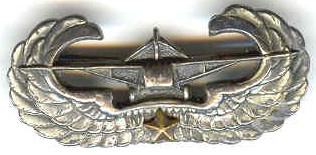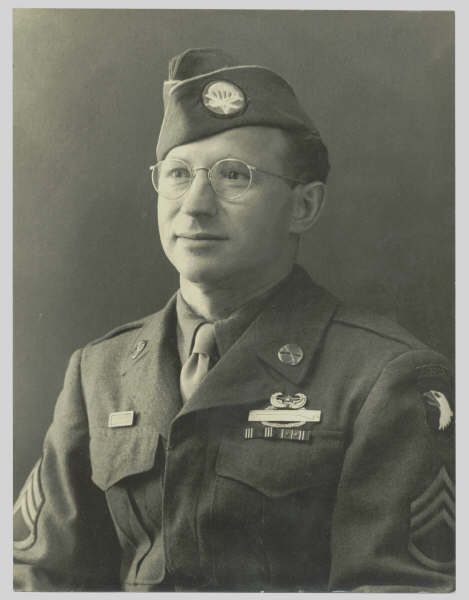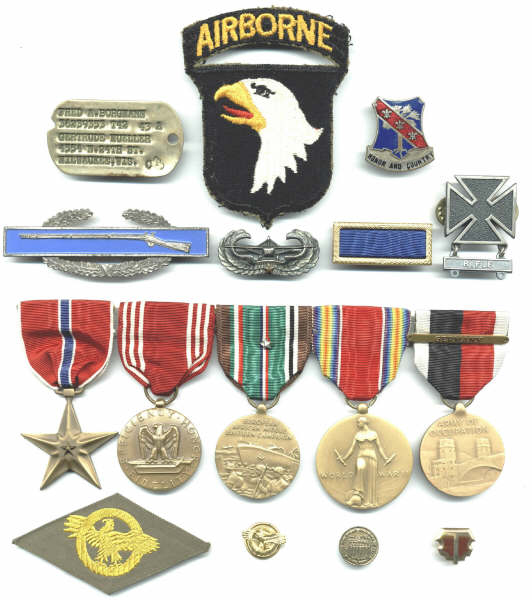All material and photos graciously supplied by SSgt Bogmann's son Fred J. Borgmann

|
SSgt Fred A. Borgmann - 101st AB 327th GIR Co. B.
All material and photos graciously supplied by SSgt Bogmann's son Fred J. Borgmann
|
|

|
|

|

|
|
Born in Dusseldorf Germany in August of 1907, his first military experience was in 1914 when as a boy watching the German troops parade off to war he was picked up by the soldiers and put on one of the horses of a field artillery unit for a short ride. After the war in 1919 he nearly died of starvation during the allied food blockade. His ordeal and recovery left him a deeply religious man. The civil war in Germany between the Communists and the Nazis convinced him that neither side was any good. He finished his training as a baker and immigrated to the United States in 1927. In the U. S. he found that he was allergic to the bleached flour commonly in use and began learning to cook as new trade. He was the cook at St Josephs Hospital and eventually became a chef at some of Milwaukee's finest restaurants. He became a citizen in 1936 and in 1942 at the age of 35 he was drafted into the U.S.Army were he was assigned to the airborne. At 5 feet tall and weighing less than 120 pounds he was the probably one of the oldest and smallest privates in the army. During basic training it was discovered that he was a baker and a chef and after two months as a Private he was promoted to Technician Fourth Grade (three stripes above the letter "T" ) and put in charge of the mess hall. Before shipping out to Europe he was given the option to transfer to a Pacific bound unit because he had three brothers in the German army. He chose to stay and help liberate his homeland. Of his many experiences during the war the following are the most important. When the army was about to capture Dusseldorf the Germans started to shell the Americans with a large railroad gun. The gun had to be silenced but the Germans kept moving and hidding it between shellings. What was left of Dusseldorf would have to be leveled and the order was about to be given when someone remembered that this was Sgt. Shorty's home town. Based on his childhood memories Borgmann pointed out a few locations on the map where there were railroad tunnel entrances. Those locations were blasted and the gun was never heard from again thus saving the lives of countless civilians huddled in the basements of their bombed out homes. (Dusseldorf was 88% destroyed.) Throughout the European Campaign there were always hungry women and children around the army field kitchens begging for food and Sgt. Borgmann always gave away any left over food. This was fine until they crossed the German border when an order came down that from that time on all left over food was to be burned or buried. Sgt. Borgmann refused to obey that order and was charged with a court-martial offense. His Catholic Chaplin wouldn't help and only advised him to obey orders. The Lutheran Chaplin however did all he could to help. In his defense Borgmann paraphrased General Eisenhower's statement that the war was a "Christian Crusade" and then said that as Christians it is our duty to bury the dead, heal the sick and FEED THE HUNGRY ! The charges were dropped and new orders came down permitting Sgt. Borgmann to continue giving away left over food to civilians. As the war came to an end the 101st moved into Berchtesgaden where Sgt. Borgmann found a suitable building to commandeer for the mess staff and then informed the family living there in perfect German that they had to pack up and move out. Not the best way to meet a future wife!! In 1948 he returned and married the family's eldest daughter. |